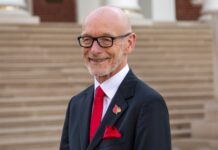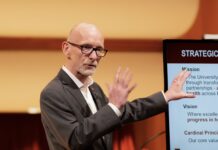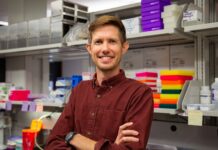Now volunteer director of Louisville Grows, Battcher again is active at UofL as her organization partners with the Cultural Center on its Common Garden project. She writes about the connection in this month’s UofL Green Scene.
The economic impact of our buying behavior largely determines the food landscape of our communities. Beyond little doubt there is — and has been for some time now — a progressive movement in Louisville towards creating a more sustainable food network. Many key players throughout our city serve a wide range of interests, yet those interests are consistently parallel to a core goal of food security for all of our people.
Louisville Grows is a new group of defiantly enthusiastic young professionals, enthralled by the synergy formed in joining this budding movement. It is our undeniable contention that education and food security are indivisible.
For the conscientious Louisvillian, it is becoming less and less attractive to rely blindly on food that travels 1,500 miles on average to the shelves of our large conglomerate stores. Convenience reigns at these large stores, which house nearly 90,000 products — not a quarter of which are whole foods, but rather are processed derivatives of corn.
Such convenience is fueled by technological advances which have created unprecedented economies of scale in food production and reduced farms to industrialized processes that churn out genetically modified crops by the millions to be transported extreme distances. For most of us, our health — environmental, social and physical — is more important than convenience, so we dig deeper. One out of every three children is obese; food today contains measurably fewer nutrients than did food 50 years ago; and our local farmers testify that they need our support to keep them afloat. All of this captures our attention in ways that affect our buying decisions.
At Louisville Grows, we suggest that education can help integrate purchasing power with growing power. Our purchasing choices (i.e. buying from local farmers) steer us to eat the most wholesome food while supporting our local economy, yet comprehensive food education can empower us to supplement these purchases with the ability to feed ourselves. Many of us wish to learn more about growing food in the square feet of our urban landscape in order to most broadly foster food security throughout our city.
Students represent a generation of future educators and advocates who have the power to redefine food in society. The University of Louisville is working on a daily basis to find sustainable solutions to some of today’s most pressing societal concerns.
In this context, Louisville Grows is organizing a community garden on Belknap Campus to address the growing power of food policy at a ground level. UofL’s Cultural Center and Louisville Grows are prepared to offer a series of workshops which will synergistically play host to experts from the community, offering UofL students the expertise to make this garden a success. The Garden Commons at the Cultural Center will be a learning tool for this and future generations of UofL students to explore their roles in the leadership of urban agriculture, sustainable growing practices and the cultivation of a healthier Louisville and a more resilient Earth.
For the community at large, we foresee that this project will be a model for other community gardens through advocacy, education and outreach by UofL students.


























